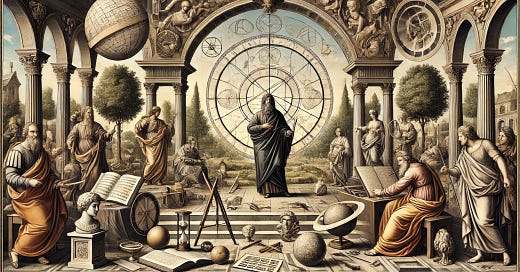I’ll start posting short blurbs on Sundays as part of my Sunday Shorts Series.
When I spoke with Robin Hanson (UPDATE: out now), I told him that my podcast was generally about the “nature of reality.” This is a notoriously vague phrase.
What is reality? And what does someone mean by its “nature”?
Let’s briefly define terms.
Nature of Reality: Beyond the Buzzword
When I say I "investigate the nature of reality," I typically mean I’m exploring fundamental questions about existence, truth, and the structure of the universe. Almost every single word there is important, from “fundamental” to “structure” to “exploring.”
In terms of topics, it means:
Philosophy: Examining metaphysical questions such as "What is real?" (realism vs. anti-realism), "Do objects exist independently of perception?" (idealism vs. materialism), and "What is the nature of time, space, and causality?" This is just the tip of the iceberg, of course.
Physics: Studying the fundamental laws governing reality, such as quantum theory, relativity (usually general relativity), and cosmology.
Mathematics: Investigating whether mathematical structures are discovered or invented and whether they underpin physical reality (mathematical Platonism vs. formalism).
Cognitive Science: Studying perception, consciousness, and how the brain constructs reality, addressing questions of subjective vs. objective reality. Again, I echo what the guy says on a date: This is only the tip.
Theology and Mysticism: Exploring whether reality extends beyond the physical, including concepts of God, spirituality, and non-material existence.
Why Laws?: The question of why the universe follows laws, and if it’s even well-defined to think of “The Universe” as a single set. Perhaps reality is patchworked with consistency in overlapping regions but inconsistency and ill-definedness as a “total” (the degree to which we can conceptualize the “total,” even the degree to which the "total" exists).
Fundamental ≠ Bottom Level
You also get into questions of fundamentality as distinct from reductionism. Often people will conflate what is most fundamental is what is at its most reduced layer, and they may point to sub-atomic particles as being fundamental, but let’s just define these terms.
Reductionism means that in order to study some object or structure, you can completely do so by analyzing the parts (as well as the interactions between the parts). Fundamentality may seem like it is what is the smallest part. However, you can be fundamental about spacetime, and spacetime itself is decidedly not small.
Something is fundamental if its existence isn’t dependent on anything else. What does this mean?
Well, the laws of nature themselves may be fundamental, but it’s not like they’re a “part” of something which, when you break that thing down, you find little pieces of “laws of nature.” That’s why I make such an insistence that I attempt to study what’s fundamental while withholding judgment on whether reductionism is true (or false).
I do find many idealists are similar to materialists in that they apply a reductionistic framework and find that everything is “made of consciousness” or “made of material” and form their philosophical substance abutment there. Same with those who say “it’s all information.”
It’s difficult to conceive of fundamentality as disembroiled from reductionism, but it’s necessary since reductionism may be incorrect as a guiding principle toward understanding the “nature of reality” (despite its clear practical success).
Of course, different fields approach the question with different methods, such as empirical science, logical reasoning, phenomenology, meditative drug-induced introspection, hermeneutics, and even art.
I want to hear from you in the Substack comment section below. I read each and every response.
—Curt Jaimungal
PS: That last one, “art,” is one I’ll be exploring more and more on the Theories of Everything channel and here on Substack (subscribe). My background is fairly evenly distributed between the analytic and the artistic. Sure, I have a background in mathematical physics and study formal systems daily, but I also play the guitar, was in a band (vocalist), did stand-up comedy, drew anime for years, and was also a producer, screenwriter, director, video editor, animator, and rapper. I've dabbled in close-up card magic / mentalism and probably more that I’m forgetting.
I only realized this recently because I went to an event called Polymath, where there were a variety of people from a variety of backgrounds. Many artists came up to me, telling me about how they like that I share their background despite the podcast being so heavily involved in philosophy, physics, and math. Consider that a plug for my Polymath talk below.






Hi Curt! I've been a big fan of your work for years now. Your interviews with folks like Donald Hoffman have led me to be in the "Consciousness is Fundamental" lane for a while now, and man, does that open up one's apature for "what is possible". Lately, I've started to think of it as "Consciousness is MORE fundamental..." but the idea of "fundamentality" is probably not really applicable or achievable for us. There may be an impenetrable level of absurdity and paradox to "reality as we can understand it". This is not a new idea, nor is it an excuse to stop trying to understand. Dang Turtles!
This is a very decent write-up. Why did I not think of it? ;-)
This was A+ :
_I do find many idealists are similar to materialists in that they apply a reductionistic framework and find that everything is “made of consciousness” or “made of material” and form their philosophical substance abutment there. Same with those who say “it’s all information.”_